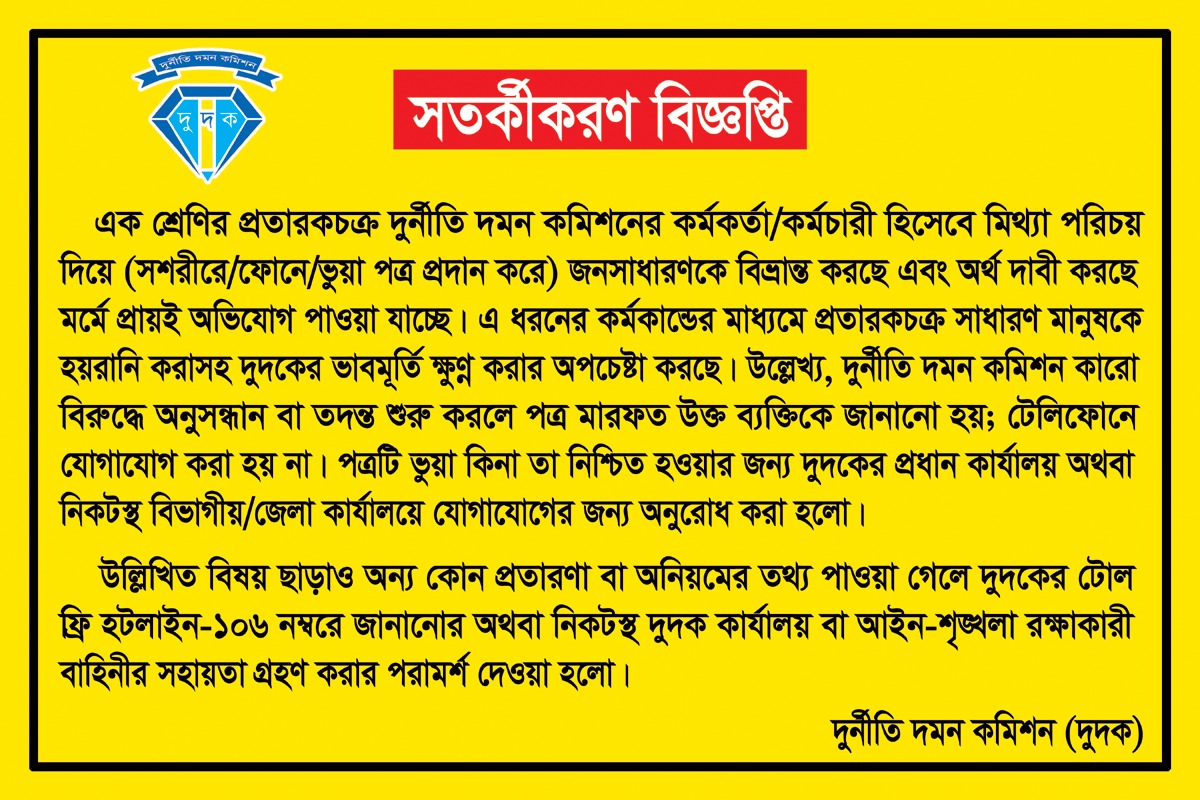GRS Policies -guidelines ও List of Scheduled Offences
Policies and guidelines
1. Nomination of focal point officers on GRS by different ministries/divisions;
4. Activities relating to the Grievence Redress System (GRS).
5. Grievance Redress System Guidelines, 2015 (Revised 2018)
Description of Scheduled Offences under the Anti-Corruption Act.
Prevention of Corruption Act 1947
Section (5(2) Criminal Misconduct:
- Any public servant who commits or attempts to commit criminal misconduct shall be punishable with imprisonment for a term which may extend to seven years, or with fine, or with both, and the fiscal resources or property to which the criminal misconduct relates may also be confiscated to the State.
109. Punishment of abetment if the act abetted is committed in consequence and where no express provision is made for its punishment.-- Whoever abets any offence shall, if the act abetted is committed in consequence of the abetment, and no express provision is made by this Code for the punishment of such abetment, be punished with the punishment provided for the offence.
120A. Definition of criminal conspiracy.-- When two or more persons agree to do, or cause to be done,-
- (1) an illegal act, or
- (2) anact which is not illegal by illegal means, such an agreement is designated a criminal conspiracy: Provided that no agreement except an agreement to commit an offence shall amount to a criminal conspiracy unless some act besides the agreement is done by one or more parties to such agreement in pursuance thereof. Explanation.- It is immaterial whether the illegal act is the ultimate object of such agreement, or is merely incidental to that object.
120B. Punishment of criminal conspiracy:
- (1) Whoever is a party to a criminal conspiracy to commit an offence punishable with death, imprisonment for life or rigorous imprisonment for a term of two years or upwards, shall, where no express provision is made in this Code for the punishment of such a conspiracy, be punished in the same manner as if he had abetted such offence.
- (2) Whoever is a party to a criminal conspiracy other than a criminal conspiracy to commit an offence punishable as aforesaid shall be punished with imprisonment of either description for a term not exceeding six months, or with fine or with both.
161. Public servant taking gratification other than legal remuneration in respect of an official act:
- Whoever, being or expecting to be a public servant, accepts or obtains, or agrees to accept, or attempts to obtain from any person, for himself or for any other person any gratification whatever, other than legal remuneration, as a motive or reward for doing or forbearing to do any official act or for showing or for bearing to show, in the exercise of his official functions, favour or disfavour to any person, or for rendering or attempting to render any service or disservice to any person, with the Government or Legislature, or with any public servant, as such, shall be punished with imprisonment of either description for a term which may extend to three years, or with fine, or with both.
162. Taking gratification by corrupt or illegal means, to influence public servant:
162. Whoever accepts or obtains, or agrees to accept, or attempts to obtain, from any person, for himself or for any other person, any gratification whatever as a motive or reward for inducing, by corrupt or illegal means, any public servant to do or to forbear to do any official act, or in the exercise of the official functions of such public servant to show favour or disfavour to any person, or to render or attempt to render any service or disservice to any person with the Government or Legislature, or with any public servant, as such, shall be punished with imprisonment of either description for a term which may extend to three years, or with fine, or with both.
163. Taking gratification, for exercise of personal influence with public servant:
163. Whoever accepts or obtains, or agrees to accept or attempts to obtain, from any person, for himself or for any other person, any gratification whatever, as a motive or reward for inducing, by the exercise of personal influence, any public servant to do or to forbear to do any official act, or in the exercise of the official functions of such public servant to show favour or disfavour to any person, or to render or attempt to render any service or disservice to any person with the Government or Legislature, or with any public servant, as such, shall be punished with simple imprisonment for a term which may extend to one year, or with fine, or with both.
164. Punishment for abetment by public servant of offences defined in section 162 or 163:
164. Whoever, being a public servant, in respect of whom either of the offences defined in the last two preceding sections is committed, abets the offence, shall be punished with imprisonment of either description for a term which may extend to three years, or with fine, or with both.
165. Public servant obtaining valuable thing, without consideration, from person concerned in proceeding or business transacted by such public servant:
165. Whoever, being a public servant, accepts or obtains, or agrees to accept or attempts to obtain, for himself, or for any other person, any valuable thing without consideration, or for a consideration which he knows to be inadequate, from any person whom he knows to have been, or to be, or to be likely to be concerned in any proceeding or business transacted or about to be transacted by such public servant, or having any connection with the official functions of himself or of any public servant to whom he is subordinate, or from any person whom he knows to be interested in or related to the person so concerned, shall be punished with imprisonment of either description for a term which may extend to three years, or with fine, or with both.
165-B. A person shall be deemed not to abet an offence punishable under section 161 or section 165 if he is induced, compelled, coerced, or intimidated to offer or give any such gratification as is referred to in section 161 for any of the purposes mentioned therein, or any valuable thing without consideration, or for an inadequate consideration, to any such public servant as is referred to in section 165.
166. Public servant disobeying law, with intent to cause injury to any person: 166. Whoever, being a public servant, knowingly disobeys any direction of the law as to the way in which he is to conduct himself as such public servant, intending to cause, or knowing it to be likely that he will, by such disobedience, cause injury to any person, shall be punished with simple imprisonment for a term which may extend to one year, or with fine, or with both.
167. Public servant framing an incorrect document with intent to cause injury: 167. Whoever, being a public servant, and being, as such public servant, charged with the preparation or translation of any document, frames or translates that document in a manner which he knows or believes to be incorrect, intending thereby to cause or knowing it to be likely that he may thereby cause injury to any person, shall be punished with imprisonment of either description for a term which may extend to three years, or with fine, or with both.
168. Public servant unlawfully engaging in trade:
168. Whoever, being a public servant, and being legally bound as such public servant not to engages in trade, engages in trade, shall be punished with simple imprisonment for a term which may extend to one year, or with fine, or with both.
169. Public servant unlawfully buying or bidding for property:
169. Whoever, being a public servant, and being legally bound as such public servant, not to purchase or bid for certain property, purchases or bids for that property, either in his own name or in the name of another, or jointly, or in shares with others, shall be punished with simple imprisonment for a term which may extend to two years, or with fine, or with both; and the property, if purchased, shall be confiscated.
217. Public servant disobeying direction of law with intent to save person from punishment or property from forfeiture:
217. Whoever, being a public servant, knowingly disobeys any direction of the law as to the way in which he is to conduct himself as such public servant, intending thereby to save, or knowing it to be likely that he will thereby save, any person from legal punishment, or subject him to a less punishment than that to which he is liable, or with intent to save, or knowing that he is likely thereby to save, any property from forfeiture or any charge to which it is liable by law, shall be punished with imprisonment of either description for a term which may extend to two years, or with fine, or with both.
218. Public servant framing incorrect record or writing with intent to save person from punishment or property from forfeiture।
218. Whoever, being a public servant, and being as such public servant, charged with the preparation of any record or other writing, frames that record or writing in a manner which he knows to be incorrect, with intent to cause, or knowing it to be likely that he will thereby cause, loss or injury to the public or to any person, or with intent thereby to save, or knowing it to be likely that he will thereby save, any person from legal punishment, or with intent to save, or knowing that he is likely thereby to save, any property from forfeiture or other charge to which it is liable by law, shall be punished with imprisonment of either description for a term which may extend to three years, or with fine, or with both.
408. Criminal breach of trust by clerk or servant:
408. Whoever, being a clerk or servant or employed as a clerk or servant, and being in any manner entrusted in such capacity with property, or with any dominion over property, commits criminal breach of trust in respect of that property, shall be punished with imprisonment of either description for a term which may extend to seven years, and shall also be liable to fine.
409. Criminal breach of trust by public servant, or by banker, merchant or agent:
409. Whoever, being in any manner entrusted with property, or with any dominion over property in his capacity of a public servant or in the way of his business as a banker, merchant, factor, broker, attorney or agent, commits criminal breach of trust in respect of that property, shall be punished with 1[ imprisonment for life], or with imprisonment of either description for a term which may extend to ten years, and shall also be liable to fine.
477A. 2[ Falsification of accounts:
Whoever, being a clerk, officer or servant, or employed or acting in the capacity of a clerk, officer or servant, willfully, and with intent to defraud, destroys, alters, mutilates or falsifies any book, paper, writing, valuable security or account which belongs to or is in the possession of his employer, or has been received by him for or on behalf of his employer, or willfully, and with intent to defraud, makes or abets the making of any false entry in, or omits or alters or abets the omission or alteration of any material particular from or in. any such book, paper, writing, valuable security or account, shall be punished with imprisonment of either description for a term which may extend to seven years, or with fine, or with both. Explanation.- It shall be sufficient in any charge under this section to allege a general intent to defraud without naming any particular person intended to be defrauded or specifying any particular sum of money intended to be the subject of the fraud, or any particular day on which the offence was committed.
511. Punishment for attempting to commit offences punishable with imprisonment for life or other imprisonment.
511. Whoever attempts to commit an offence punishable by this Code with 1[ imprisonment for life] or imprisonment, or to cause such an offence to be committed, and in such attempt does any act towards the commission of the offence, shall, where no express provision is made by this Code for the punishment of such attempt, be punished with 2[ imprisonment o f any description provided for the offence, for a term which may extend to one- half of the imprisonment for life or, as the case may be, one- half of the longest term of imprisonment provided for that offence], or with such fine as is provided for the offence, or with both.
Money Laundering Prevention Act, 2012
2. Unless there is anything repugnant in the subject or context, in this Act –
(v) “money laundering” means
- (i) knowingly moving, converting, or transferring proceeds of crime or property involved in an offence for the following purposes:-
(1) concealing or disguising the illicit nature, source, location, ownership or control of the proceeds of crime; or
(2) assisting any person involved in the commission of the predicate offence to evade the legal consequences of such offence;
- (ii) smuggling money or property earned through legal or illegal means to a foreign country;
- (iii) knowingly transferring or remitting the proceeds of crime to a foreign country or remitting or bringing them into Bangladesh from a foreign country with the intention of hiding or disguising its illegal source;
- (iv) concluding or attempting to conclude financial transactions in such a manner so as to reporting requirement under this Act may be avoided;
- (v) converting or moving or transferring property with the intention to instigate or assist for committing a predicate offence; (vi) acquiring, possessing or using any property, knowing that such property is the proceeds of a predicate offence; (vii) performing such activities so as to the illegal source of the proceeds of crime may be concealed or disguised; (viii) participating in, associating with, conspiring, attempting, abetting, instigate or counsel to commit any offences mentioned above;
4. Offence of money laundering and punishment.–
- (1) For the purposes of this Act, money laundering shall be deemed to be an offence.
- (2) Any person who commits or abets or conspires to commit the offence of money laundering, shall be punished with imprisonment for a term of at least 4(four) years but not exceeding 12(twelve) years and, in addition to that, a fine equivalent to the twice of the value of the property involved in the offence or taka 10(ten) lakhs, whichever is greater.
- (3) In addition to any fine or punishment, the court may pass an order to forfeit the property of the convicted person in favour of the State which directly or indirectly involved in or related with money laundering or any predicate offence.
- (4) Any entity which commits an offence under this section shall be punished with a fine of not less than twice of the value of the property or taka 20(twenty) lacks, whichever is greater and in addition to this the registration of the said entity shall be liable to be cancelled.
- (5) It shall not be a prerequisite to charge or punish for money laundering to be convicted or sentenced for any predicate offence.
Anti-Corruption Act, 2004
26. Declaration of properties
(1) If the commission is satisfied on the basis of its own information and after necessary investigation that any person or any other person on his behalf is in possession or has obtained ownership of property not consistent with his legal sources of income then the commission through an order in writing shall ask that person to submit a statement of assets and liabilities in the manner determined by the commission and to furnish any other information mentioned in that order.
(2) If any person -
- (a) after having received an order mention in sub-section (1) fails to submit the written statement or furnish the information accordingly or submits any written statement or provides any information that is false or baseless or there are sufficient grounds to doubt their veracity o
- (b) submits any book, account, record, declaration, return or any document under sub-section (1) or gives any statement that is false or baseless or there are sufficient grounds to doubt its veracity, then that person will be sentenced to a prison term of up to three (3) years or a fine or both.
27. Possession of Property in Excess of Known Sources of Income –
- (1) If there are sufficient and reasonable grounds to believe that a person in his/her own name or any other person on his/her behalf is in possession and has obtained ownership of moveable or immoveable property through dishonest means and the property is not consistent with the known sources of his/her income and if he/she fails to submit to the court during trial a satisfactory explanation for possessing that property, then that person shall be sentenced to a prison terms ranging from a minimum of three (3) years to a maximum of ten years imprisonment, and these properties shall be confiscated.
- (2) If it is proved during the trial of charges under sub-section (1) that the accused person in his own name or any other person on his/her behalf has obtained ownership or is in possession of moveable or immoveable property not consistent with the known sources of his/her income then the court shall presume that the accused person is guilty of the charges and unless the person rebuts that presumption in court the punishment meted out on the basis of this presumption shall not be unlawful.







